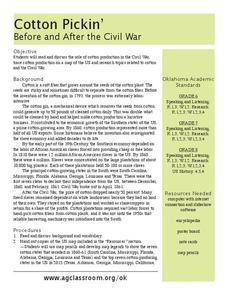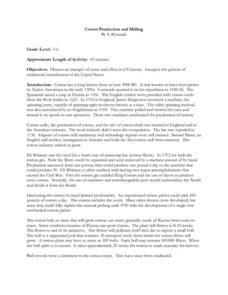ResourcesWeb & Docs
MediaVideo & Audio
CollectionsLessons & Topics
AI Teacher ToolsInstruction & Ideas
newFilter
80 results:
cotton cropsClear All
Curated OER
Agriculture: Oklahoma's Legacy
Sixth graders explore agriculture as it relates to crops over the course of a series of historical events. They read and create a timeline of the 50-year increments that depict important cause and effect events. Students then use...
Curated OER
Clothes on the Grow
Can you grow clothes? Sure, wool, cotton, and Angora are all natural resources used to make textile products. Learners investigate the differences between synthetic and natural fibers, then consider textile processing careers. They watch...
Curated OER
Cotton Pickin' Before and After the Civil War
Students explore the impact of cotton. In this economics lesson, students listen to a lecture presented by their instructor on the Southern crop of cotton and its impact on the South prior to and following the Civil War. Students...
Curated OER
King Cotton
Sixth graders investigate the farming process for cotton and its impact on the United States history. In this cotton farming instructional activity, 6th graders read background information on the cotton farming process and discuss the...
Curated OER
The Sweet Connection
Students use maps to find what crops are dominant in areas where honey bees are raised and discuss possible correlations. They mark the top ten honey- producing states on a US map.
Curated OER
An International Dinner Table
Students investigate the origins of several crops eaten in the United States today. The facto0rs that influence consumer choices and the influences on the American population as to eating preferences are discussed in this lesson.
Curated OER
From cotton to Baseball: How Greenville Grew
Eighth graders explore the impact of textile production and baseball of the mills and communityof Greenville SC
Curated OER
Oklahoma Grown: Discovering Oklahoma's Agriculture
Fourth graders investigate where Oklahoma's variety of crops are harvested, and grown their own plants. A printable map and crop information guide are provided.
Curated OER
Ag in My Community; Agriculture
Students build knowledge about agriculture as it relates to their communities' commodities. In this agriculture lesson, students brainstorm about conditions in their community with regards to growing different types...
Curated OER
Cotton Production and Milling
Young scholars examine cotton production and milling. They compete in a hand-ginning contest to realize how difficult it was to separate the seeds from the fibers of cotton. They discuss why Eli Whitney's cotton gin was an important...
Curated OER
Will You Pick My Cotton?
Use this cross-curricular history lesson to work on your young scholars' informational writing skills. After listening to songs and stories related to Sultana, they engage in a several activities to boost their understanding of slavery...
Curated OER
COTTON AND SLAVERY IN ARKANSAS
Fifth graders read about the cotton industry in America and demonstrate the roll of slaves picking and removing seeds from a boll of cotton. The relationship between slaves and cotton production is established.
Curated OER
Colony Crops
Fifth graders determine which crops were grown in the 13 colonies depending on their climate and geography. They explore what crops are grown in the states created from the original colonies.
Curated OER
World Climate Growing Zones
Students create a map showing where crops would be grown around the world. In this crops lesson plan, students show how the world climate would produce different parts of the world at different times. Students fill out worksheets.
Curated OER
Images from South Carolina Cotton Mills
Fifth graders write a paragraph comparing their lives to the lives of a child working in South Carolina during the early 1900's. In this Industrial Revolution lesson plan, 5th graders explore primary and secondary sources to teach them...
Curated OER
The Disappearing Honeybees: Tracking Honeybee Decline
Students practice graphing and other math skills to track number of honeybee colonies present in United States since 1978, discuss major crops that are dependent on insect pollinators, and examine reasons for decline of United States...
Curated OER
Civil War and Reconstruction
Young scholars examine the differences between the North and South during the pre-Civil War era. In this Civil War era lesson plan, students spent 7 days looking at things that were different between the Union and Confederate state...
Curated OER
Just Lookin' For a Home
What is a boll weevil? Your class can find out that and more by following the activities included here. Pupils read an article, sing a boll weevil song, add to the song with their own original lyrics, illustrate the song, study the...
Curated OER
Clothesline Sleuth
Students explore the make up of fabrics. In this agriculture instructional activity, students examine the cotton and wool crops of the United States and discover how fabrics are created.
Curated OER
Nuts About Peanuts
First graders explore peanuts. In this peanut lesson plan, 1st graders examine the parts of peanut plants and identify them. Students plant their own peanut plants and chart their growth.
Curated OER
What Bees Eat
Students consider the concept that plants and animals are dependent on one another and role-play the interaction between bees and flowers. They identify crops that are dependent on pollination by bees.
Curated OER
Living Corn Necklace
Sixth graders complete an experiment to learn about hereditary traits. In this hereditary traits instructional activity, 6th graders discuss similarities and differences in corn and complete charts for their discussion. Students then use...
Curated OER
Kansas vs the U.S.
Learners demonstrate an understanding of the physical and political geography of Kansas. They view maps and films to gain knowledge of Kansas. They calculate the percentage Kansas harvests for each crop out of the national total.
Curated OER
Rice Plantation
Eighth graders study the importance of rice as a cash crop and the crop's dependency on slave labor during the settlement of coastal South Carolina. They explain the importance of the rice plantations to South Carolina's colonial economy.

























